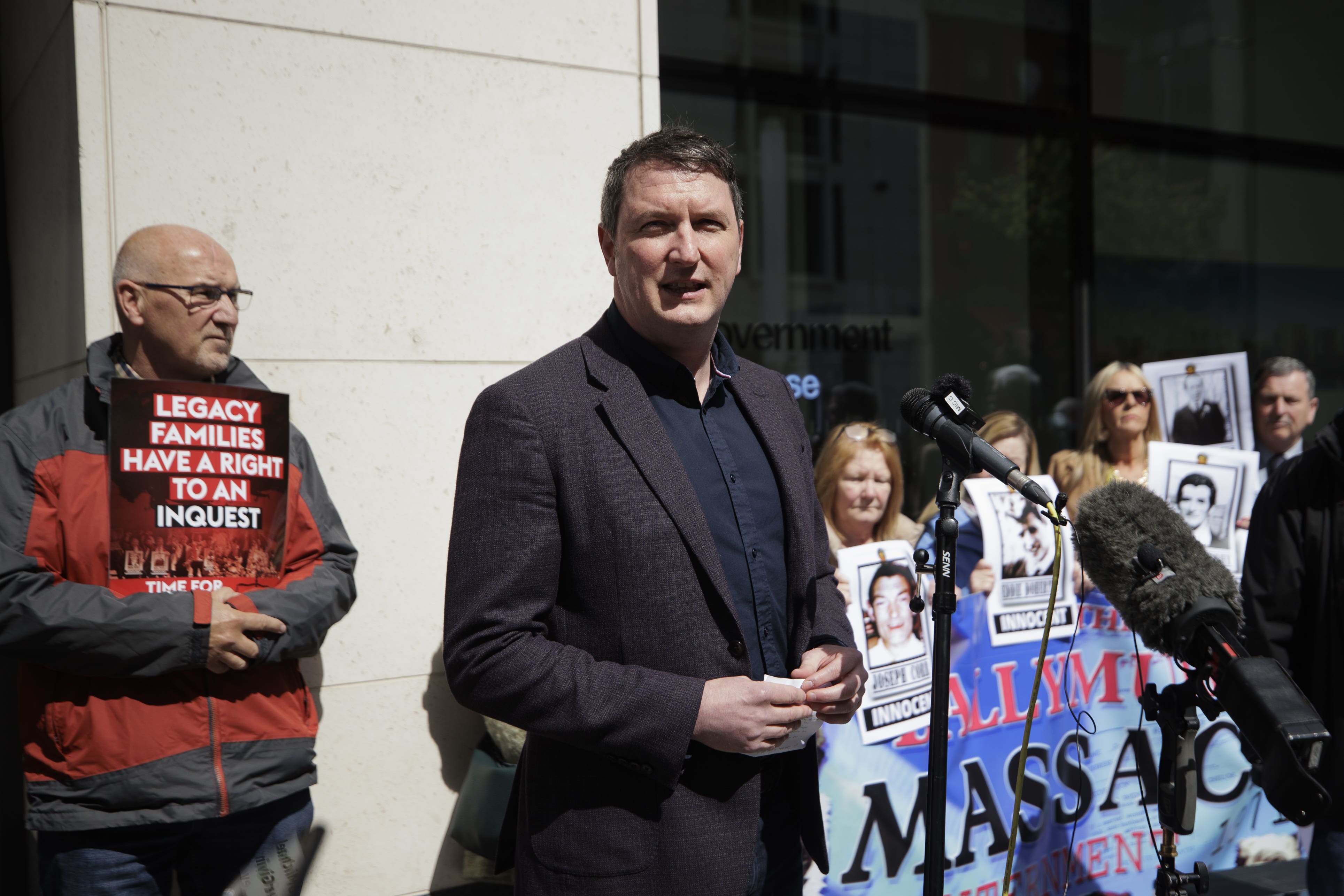Protest told introduction of new legacy laws is ‘day of shame’
Sinn Fein MP John Finucane addressed the protest meeting outside the HQ of the Northern Ireland Office in Belfast.

Your support helps us to tell the story
From reproductive rights to climate change to Big Tech, The Independent is on the ground when the story is developing. Whether it's investigating the financials of Elon Musk's pro-Trump PAC or producing our latest documentary, 'The A Word', which shines a light on the American women fighting for reproductive rights, we know how important it is to parse out the facts from the messaging.
At such a critical moment in US history, we need reporters on the ground. Your donation allows us to keep sending journalists to speak to both sides of the story.
The Independent is trusted by Americans across the entire political spectrum. And unlike many other quality news outlets, we choose not to lock Americans out of our reporting and analysis with paywalls. We believe quality journalism should be available to everyone, paid for by those who can afford it.
Your support makes all the difference.The beginning of new legacy arrangements which shut down some Troubles-era inquests represents a “day of shame”, Sinn Fein MP John Fincane has said.
Mr Finucane addressed a protest outside the headquarters of the Northern Ireland Office in Belfast city centre, where he vowed that the families of Troubles victims would never give up the search for truth and justice.
The new Independent Commission for Reconciliation and Information Recovery (ICRIR), became operational on Wednesday.
The ICRIR was created by the Government’s Legacy Act which received royal assent last year despite widespread opposition from political parties, victims’ organisations in Northern Ireland and the Irish government.
All new civil litigation and inquests into Troubles deaths which have not completed oral evidence will be stopped.
This is very much a day of shame. This is a day when legal challenges in our courts officially come to an end
Bereaved families, victims and certain public authorities can request the ICRIR carry out an investigation.
Around 100 people gathered outside the NIO to protest against the changes.
Many carried placards and photographs of family members who were killed. A large black coffin bearing the word Justice was laid at the door of the building.
Mr Finucane said: “This is very much a day of shame. This is a day when legal challenges in our courts officially come to an end.
“Challenges that have been taken by families who on some occasions have been waiting up to five decades for the simple right to ask their questions in a court room.
“For the very simple basic democratic right to have an inquest for their loved ones.
“We know the amount of inquests that have not been able to conclude. They haven’t been able to conclude because the British Government and their agencies knew that this day was coming.
“They knew and they were incentivised to delay and frustrate even more so than they had done over the previous five decades.
“The British Government have today officially removed the independence of our courts in looking at our past.”
Mr Finucane’s father Pat was murdered by loyalists in 1989.
The Sinn Fein MP said the Legacy Act had been introduced as an “obstacle in the way of families finding truth”.
He also predicted that the new arrangements would not be in place for long.
He said: “It has already been tested in our domestic courts and has been shown to be flawed.
“We await the outcome of the inter-government state case taken by the Irish Government.”
“We wait to see whether a British Labour government elected in the next election stand by their commitment to repeal this legislation.”
The protest was also addressed by Damian Brown, the grandson of murder victim Sean Brown.
In March, a legacy inquest into the death of the GAA official was halted when a coroner said his ability to examine the killing had been compromised by the extent of confidential state material being excluded from the proceedings on national security grounds.
During a hearing it emerged that state agents were among more than 25 people linked by intelligence to the murder of Mr Brown in 1997.
The Government has since launched legal action over how the coroner dealt with a Public Interest Immunity (PII) process in the case.
Mr Brown told the rally: “We invested our full faith in the inquest process.
“An inquest being the most fundamental, rudimentary, perfunctory of legal processes that the state must conclude when a life is taken in the manner in which Sean’s was stolen from him.
“Far from discharging its international obligations in law to convene and conclude Sean’s inquest, the British Government has instead abandoned its legal obligations.”
He described the Legacy Act as an “obscenity” and said opposition to it had united all communities in Northern Ireland.